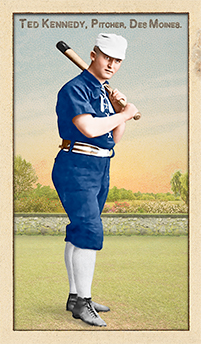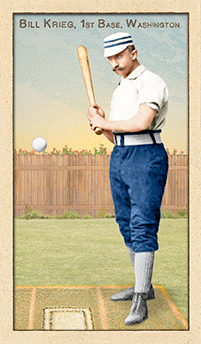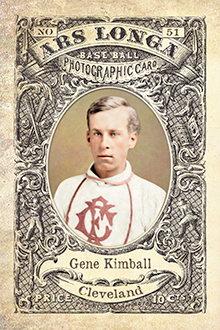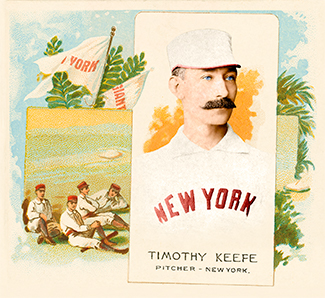
- Series: Beginnings: 1880's
- City: Des Moines
- Team: Prohibitionists
- League: Western Association
Theodore A. Kennedy (1865-1907) was an ill-starred young pitcher who learned from the best, executed effectively and, as so many of his era, flamed out early with a ruined shoulder. In our day, with Tommy John surgery nearly a rite of passage for aspiring big-leaguers, it is sobering to consider the plight of the young men of the 19th century who were thrown into unrelenting action and treated as disposable cogs in professional baseball's juggernaut. Such was the lot of Ted Kennedy. As a youth, he was ball boy in Peoria studying the not-yet-Old-Hoss Charlie Radbourn, the star pitcher for the town's very fine amateur squad. Radbourn was said to have been the first to master the overhand curve delivery that would carry him to greatness with Providence years later. Radbourn showed Ted the grip and Ted worked hard to learn it. He emerged in mid-west circles as one of the most promising young pitchers in 1884, a year of turmoil in the major leagues that left minor league teams scrambling for talent. The next season Kennedy got his break when Cap Anson brought him to Chicago. The Chicago Tribune's June 12 edition reported: “The Chicago team will place a new man in the pitcher's box today—Ned Kennedy, until recently with the Keokuk nine, and looked upon as one of the strongest unengaged pitchers in the country.” Ted's astounding strikeout record had made that reputation. Before the call-up, his highlight was 24 Ks, including 17 straight, in a game with no putouts by the first baseman against Burlington in October of '84. Sadly, Ted's arm didn't survive his rookie year. After hurling three games in two days, his shoulder gave out. Though he pitched one more year in the majors and a few in the minors, he was never the same. Kennedy later remembered, "I was terribly lame - had to pitch underhand. Every game I pitched that season it was like a rusty knife was being thrust into my shoulder."
- In retirement, Kennedy found a lucrative career in sporting goods, eventually selling out to the Spalding empire but continuing to teach youngsters how to throw the curve
- Ars Longa is indebted to the research of SABR's Craig Lammers for much of this bio
- Kennedy's uniform color on this card was changed in July, 2017 from black to blue to reflect recent reliable research by Craig Brown & friends at Threads of Our Game. One card was previously released featuring a black uniform.
- Series: 1888 Champion New York Giants
- City: New York
- Team: Giants
- League: National League
- Hall: National Baseball Hall of Fame
Smiling Tim, Sir Timothy (1857-1933). A dominant pitcher for 5 teams over 14 seasons, Keefe’s 1st season was the last in which pitchers threw from 45′ & his last season was the 1st in which they threw from 60’6″. In an extraordinary career, Keefe won 20+ gms 7x; 30+ gms 6x; 40+ gms 2x; 200+ Ks 6x; 300+ Ks 2x; & posted lowest ERA in history: 0.86 in 1880.
- Won Triple Crown: 1888
- ERA Champ: ’80, ’85, ’88
- 342 career Wins
- Elected to Hall of Fame: 1964

- Series: Beginnings: 1880's
- City: Washington, D.C.
- Team: Nationals
- League: National League
William Frederick Krieg (1859-1930) was a powerhouse in the minors, but barely left an impression in the big leagues. Coming out of Notre Dame, Krieg joined the Northwestern League's Springfield and Peoria teams in 1883. The following season he got a chance at the big time as the Union Association multiplied opportunities for young pro players. He signed on with the bi-city Chicago/Pittsburgh entry as their catcher, playing in 71 games with a .247 average. Over the next three seasons, Bill would roam among three other major league clubs and various minor league teams. His stints in the American Association and National League were brief and his output paltry.
When he finally resigned himself to play in the minors permanently, Krieg came into his own. In 1887 with the Minneapolis Millers he batted .402, second in the Northwestern League. He then became a terror in the Western Association, hitting .324 with St. Joseph in '89 and .339 with Milwaukee in ‘92, good for his first batting title. His second title was historically good, when he ravaged WA pitchers for an astounding .452 performance with the Rockford Forest Citys in 1895. He was the team's slugger, tallying 15 triples and 12 home runs.
While Krieg's time in the majors was brief, he showed remarkable durability in the game. He finally retired as a player in 1901 at age 42, but served one more season as manager for the Southern League Chattanooga squad. Bill even returned for one last hurrah as manager of Muscatine of the Central Association in 1912.

- Series: Pioneer Portraits I: 1850-1874
- City: Cleveland
- Team: Forest Citys (NAPBBP)
- League: National Association (NAPBBP)
Eugene Boynton Kimball (1850-1882) was an evanescent spirit on the early baseball scene. This ghost came to the (Cleveland) Forest Citys on May 4, 1871 and departed what was then major league play the following September. He had played in the early amateur National Association of Base Ball Players for the Alert of Rochester in 1869 and for the Cleveland club in 1870. That team was the first fully salaried team in Cleveland and was unaffiliated that season. In 1870 the Forest Citys (a designation adopted in recent years to distinguish the team from the pro club in Rockford, IL known as “Forest City”) were managed by Charlie Pabor. Charlie was dubbed “The Old Woman in the Red Cap,” giving him enduring status as the baseball figure with the most mysterious and alluring nickname of all time.
- Kimball’s debut in Rochester occurred on June 4, 1869 when the Alert hosted the powerhouse Cincinnati Red Stockings on their famed national tour. Gene played alongside other future major leaguers: John Glenn, Sam Jackson, John McKelvey and Ezra Sutton. The young amateurs held Harry Wright’s bombers to one of the closest margins of that undefeated season
- In his brief time with Cleveland, Gene managed a .191 average. He made 44 errors in 170 chances playing 2nd, 3rd, short and outfield in 29 games. It is reported that he achieved fair renown as a billiards player following his baseball career
- Series: Pioneer Portraits II: 1875-1899
- City: New York
- Team: Giants
- League: National League
- Hall: National Baseball Hall of Fame
Smiling Tim, Sir Timothy (1857-1933). A dominant pitcher for 5 teams over 14 seasons, Keefe’s 1st season was the last in which pitchers threw from 45′ & his last season was the 1st in which they threw from 60’6″. In an extraordinary career, Keefe won 20+ gms 7x; 30+ gms 6x; 40+ gms 2x; 200+ Ks 6x; 300+ Ks 2x; & posted lowest ERA in history: 0.86 in 1880.
- Won Triple Crown: 1888
- ERA Champ: ’80, ’85, ’88
- 342 career Wins
- Elected to Hall of Fame: 1964




